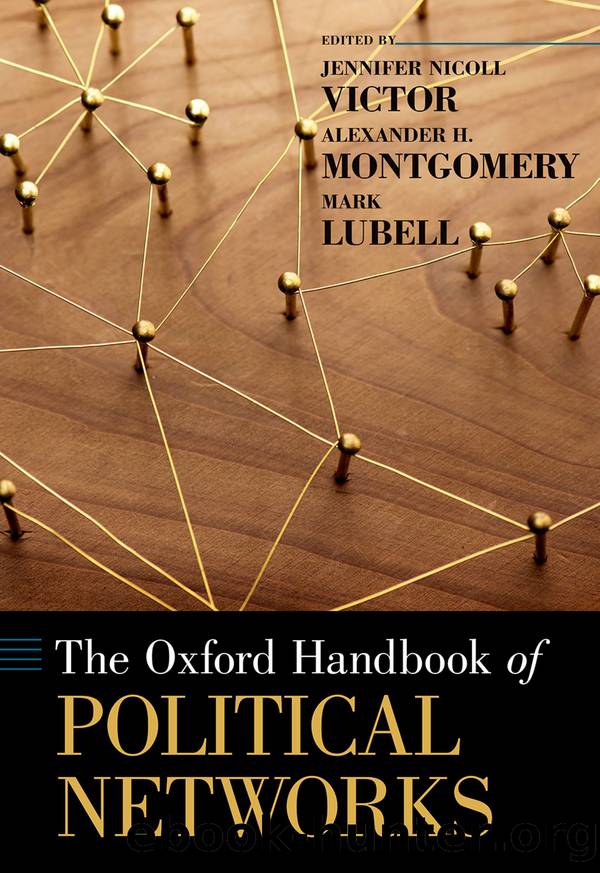The Oxford Handbook of Political Networks by Jennifer Nicoll Victor Alexander H. Montgomery and Mark Lubell

Author:Jennifer Nicoll Victor, Alexander H. Montgomery, and Mark Lubell
Language: eng
Format: epub
Publisher: Oxford University Press
Published: 2017-07-15T00:00:00+00:00
PRESTIGE NETWORKS
Jurisprudential models that permit judges to make strategic decisions based on social, political, and institutional factors require, among other things, a broader frame for analyzing judges’ conceptions of legitimacy—that is, how judges (and other legal and political actors) confer authority upon a decision (Gibson, 2007). Neither precedent nor ideological preferences can fully explain historical and contemporary examples of judges’ amending their behavior in response to other political actors (Clark, 2009); in the midst of President Franklin Roosevelt’s notorious “court-packing” scheme in 1937, for instance, the Supreme Court strategically reversed course on its opposition to Roosevelt’s New Deal legislative package. The Court overturned its own precedent to uphold labor and minimum-wage protections in an effort both to combat Roosevelt’s attempted power grab and to retain the Court’s legitimacy in the eyes of the Congress and a public that overwhelmingly supported the president’s priorities (Caldeira, 1987). In 2012, political analysts and news reports suggested that Chief Justice John Roberts switched his vote on the constitutionality of the Affordable Care Act’s (ACA) individual-mandate requirement at the eleventh hour, speculating that Roberts ultimately chose to uphold the act in a 5–4 decision due neither to legalistic considerations nor to political ideology, but rather to concern for his and the Court’s reputation (Crawford, 2012); this rationale has been shown to magnify the effect of the public’s perceived ideological proximity to the Court on their diffuse support for it (Christenson and Glick, 2015a).2
These examples are part of a long legal tradition of voting fluidity that suggests the need to incorporate the relationships among various political actors in all types of institutions in order to explain puzzling judicial behavior. Maltzman and Wahlbeck (1996) suggest that the context of the decision-making process is relevant to explaining judicial behavior, because ideological preferences are not always strict, and judges’ assessments of possible legal outcomes and the effects on their court’s institutional legitimacy evolve over the course of a case’s consideration. This suggests that judges may be susceptible to new and understudied pathways of influence, such as peer effects and socially constructed norms (e.g., the perceived power of a particular court, judge, legal actor, or opinion). Thus, formally mapping social communities of judicial actors should prove exceedingly valuable for illuminating the entire context in which judges operate and possibly for refining strategic models of judicial decision-making to account for these effects.
Prestige networks, or purely social networks, compromise a burgeoning arena of judicial network analysis that promises significant reconceptualization of how power and legitimacy are constructed in the judiciary. While analyses of citation networks and most amicus curiae networks are also predicated on the hypothesis that definitions of legal legitimacy may be at least in part socially constructed and thus constitute an independent influence on judicial decision-making, both judicial opinions and amicus briefs are prima facie founded in logically compelling legal arguments. Not so for prestige networks, which evaluate the authority and the legitimacy of judicial actors3 based wholly on social status and reputational esteem. The implicit hypothesis of prestige network analyses is that peer effects may play a role in the decision-making process of judges.
Download
This site does not store any files on its server. We only index and link to content provided by other sites. Please contact the content providers to delete copyright contents if any and email us, we'll remove relevant links or contents immediately.
The Secret History by Donna Tartt(16608)
The Social Justice Warrior Handbook by Lisa De Pasquale(11485)
Thirteen Reasons Why by Jay Asher(7782)
This Is How You Lose Her by Junot Diaz(5753)
Weapons of Math Destruction by Cathy O'Neil(5029)
Zero to One by Peter Thiel(4817)
The Myth of the Strong Leader by Archie Brown(4785)
Promise Me, Dad by Joe Biden(4440)
Stone's Rules by Roger Stone(4412)
Beartown by Fredrik Backman(4403)
How Democracies Die by Steven Levitsky & Daniel Ziblatt(4392)
The Fire Next Time by James Baldwin(4336)
100 Deadly Skills by Clint Emerson(4070)
A Higher Loyalty: Truth, Lies, and Leadership by James Comey(4024)
Rise and Kill First by Ronen Bergman(4008)
The David Icke Guide to the Global Conspiracy (and how to end it) by David Icke(3875)
The Farm by Tom Rob Smith(3869)
Secrecy World by Jake Bernstein(3773)
The Doomsday Machine by Daniel Ellsberg(3725)
